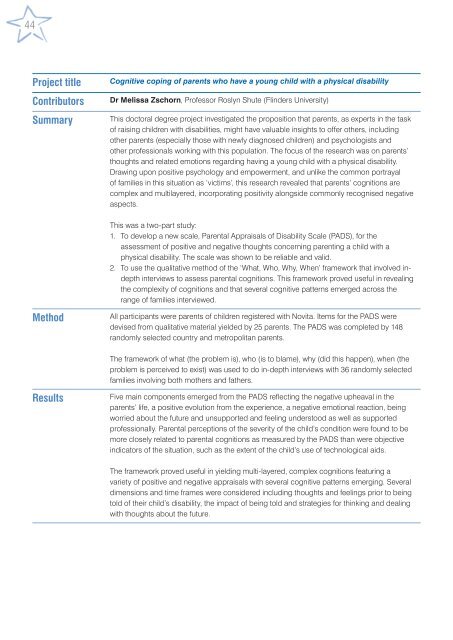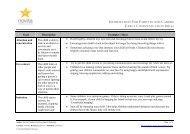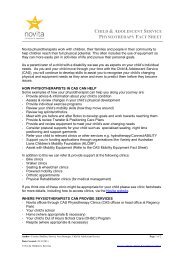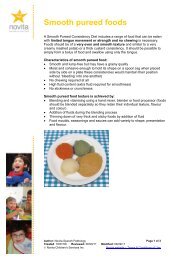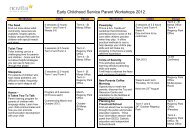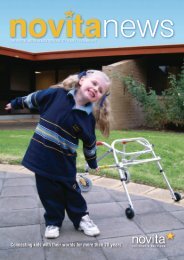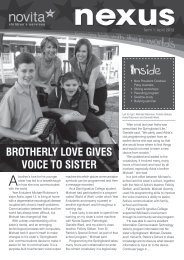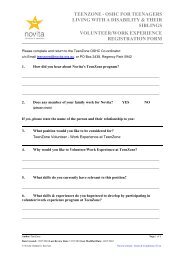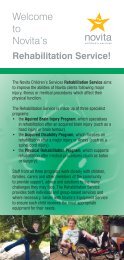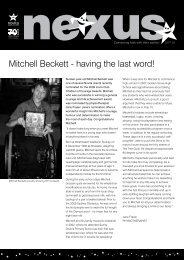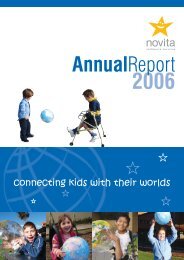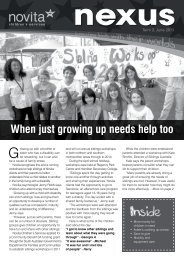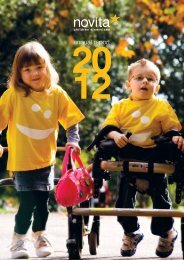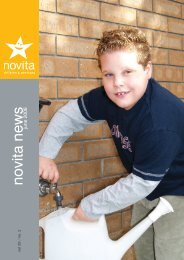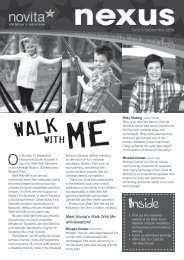Novita Research Report - 2004 to 2007 - Novita Children's Services
Novita Research Report - 2004 to 2007 - Novita Children's Services
Novita Research Report - 2004 to 2007 - Novita Children's Services
- No tags were found...
Create successful ePaper yourself
Turn your PDF publications into a flip-book with our unique Google optimized e-Paper software.
44Project titleContribu<strong>to</strong>rsSummaryCognitive coping of parents who have a young child with a physical disabilityDr Melissa Zschorn, Professor Roslyn Shute (Flinders University)This doc<strong>to</strong>ral degree project investigated the proposition that parents, as experts in the taskof raising children with disabilities, might have valuable insights <strong>to</strong> offer others, includingother parents (especially those with newly diagnosed children) and psychologists andother professionals working with this population. The focus of the research was on parents’thoughts and related emotions regarding having a young child with a physical disability.Drawing upon positive psychology and empowerment, and unlike the common portrayalof families in this situation as ‘victims’, this research revealed that parents’ cognitions arecomplex and multilayered, incorporating positivity alongside commonly recognised negativeaspects.This was a two-part study:1. To develop a new scale, Parental Appraisals of Disability Scale (PADS), for theassessment of positive and negative thoughts concerning parenting a child with aphysical disability. The scale was shown <strong>to</strong> be reliable and valid.2. To use the qualitative method of the ‘What, Who, Why, When’ framework that involved indepthinterviews <strong>to</strong> assess parental cognitions. This framework proved useful in revealingthe complexity of cognitions and that several cognitive patterns emerged across therange of families interviewed.MethodAll participants were parents of children registered with <strong>Novita</strong>. Items for the PADS weredevised from qualitative material yielded by 25 parents. The PADS was completed by 148randomly selected country and metropolitan parents.The framework of what (the problem is), who (is <strong>to</strong> blame), why (did this happen), when (theproblem is perceived <strong>to</strong> exist) was used <strong>to</strong> do in-depth interviews with 36 randomly selectedfamilies involving both mothers and fathers.ResultsFive main components emerged from the PADS reflecting the negative upheaval in theparents’ life, a positive evolution from the experience, a negative emotional reaction, beingworried about the future and unsupported and feeling unders<strong>to</strong>od as well as supportedprofessionally. Parental perceptions of the severity of the child’s condition were found <strong>to</strong> bemore closely related <strong>to</strong> parental cognitions as measured by the PADS than were objectiveindica<strong>to</strong>rs of the situation, such as the extent of the child’s use of technological aids.The framework proved useful in yielding multi-layered, complex cognitions featuring avariety of positive and negative appraisals with several cognitive patterns emerging. Severaldimensions and time frames were considered including thoughts and feelings prior <strong>to</strong> being<strong>to</strong>ld of their child’s disability, the impact of being <strong>to</strong>ld and strategies for thinking and dealingwith thoughts about the future.


